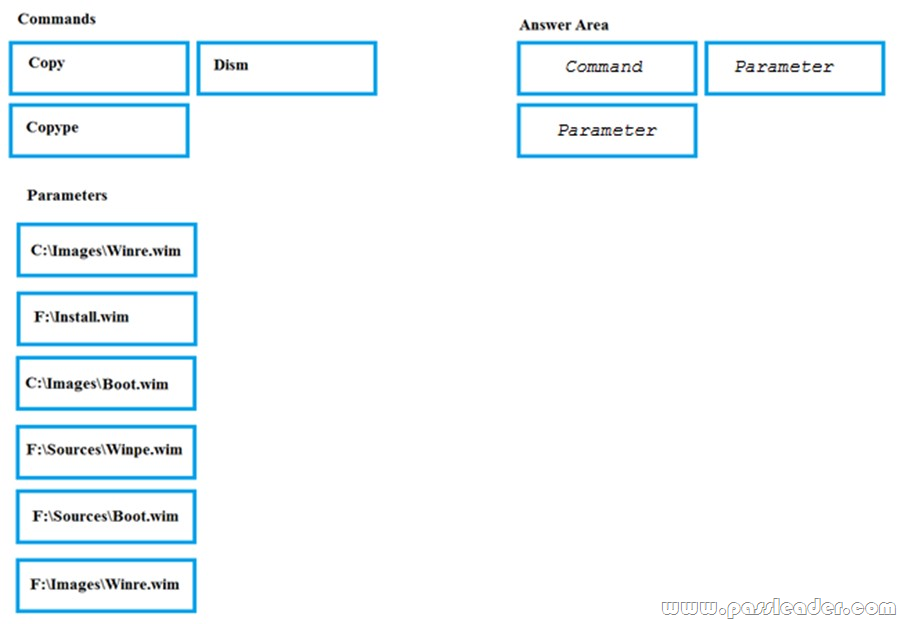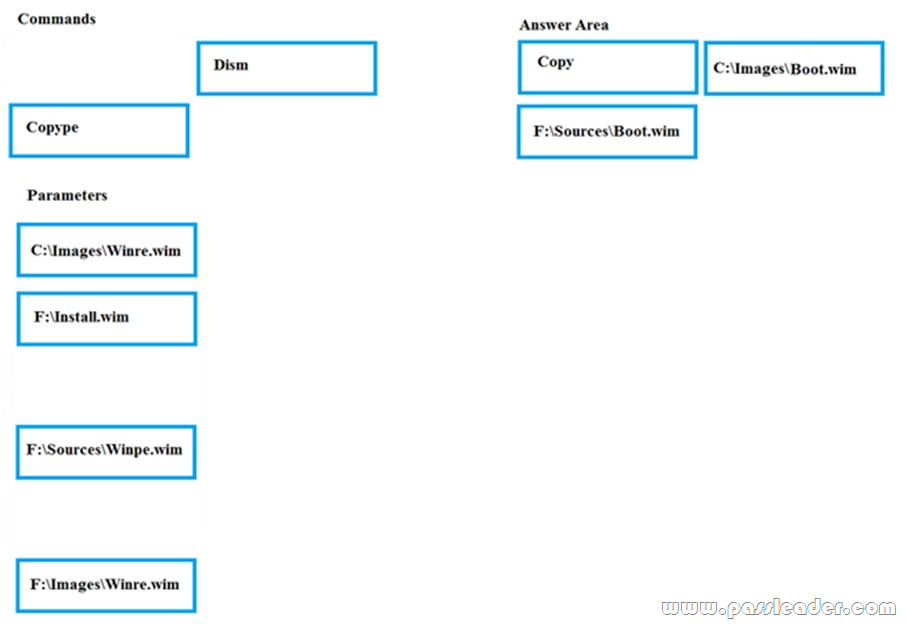Valid 70-412 Dumps shared by PassLeader for Helping Passing 70-412 Exam! PassLeader now offer the newest 70-412 VCE dumps and 70-412 PDF dumps, the PassLeader 70-412 exam questions have been updated and ANSWERS have been corrected, get the newest PassLeader 70-412 dumps with VCE and PDF here: https://www.passleader.com/70-412.html (486 Q&As Dumps)
BTW, DOWNLOAD part of PassLeader 70-412 dumps from Cloud Storage: https://drive.google.com/open?id=0B-ob6L_QjGLpfm94alk1eU9xWjFYRkVoNkl0cjRiOXZRRjVkUXNXTklicDdKZDJwRGJCM1k
NEW QUESTION 466
Your network contains an Active Directory domain named contoso.com. A previous administrator implemented a Proof of Concept installation of Active Directory Rights Management Services (AD RMS). After the proof of concept was complete, the Active Directory Rights Management Services server role was removed. You attempt to deploy AD RMS. During the configuration of AD RMS, you receive an error message indicating that an existing AD RMS Service Connection Point (SCP) was found. You need to remove the existing AD RMS SCP. Which tool should you use?
A. Services
B. Authorization Manager
C. Active Directory Sites and Services
D. TMP Management
E. Active Directory Users and Computers
F. Active Directory Domains and Trusts
Answer: C
Explanation:
https://kb.watchfulsoftware.com/pages/viewpage.action?pageId=1999181
NEW QUESTION 467
You have a Hyper-V failover cluster named Cluster1. On Cluster1, you create a virtual machine named VM1 that runs Windows Server 2012 R2. You need to move VM1 by using quick migration. What should you use?
A. the failover Cluster manager console
B. the Move-VM cmdlet
C. the Hyper-V Manager console
D. the Start-VMFailover cmdlet
Answer: A
Explanation:
https://www.altaro.com/hyper-v/hyper-v-live-migration-methods/
NEW QUESTION 468
You have two Hyper-V hosts named Server1 and Server2 that run Windows Server 2012 R2. Server1 is in workgroup. Server2 is in a domain. On Server1, you create a virtual machine named VM1. You need to ensure that you can use live migration to move VM1 from Server1 to Server2. What should you do first?
A. Create a hidden share named LiveMig$ on Server2.
B. Configure the Administration account on Server2 to use the same password.
C. Add Server1 to a domain.
D. Modify the Integration Services settings of VM1.
Answer: C
Explanation:
https://docs.microsoft.com/en-us/windows-server/virtualization/hyper-v/deploy/set-up-hosts-for-live-migration-without-failover-clustering
NEW QUESTION 469
Your network contains an Active Directory domain. The domain contains two Hyper-V hosts named Server1 and Server2 that run Windows Server 2012 R2. Live migration is configured in Server1 and Server2. You sign in to Server1, and then you create a virtual machine named VM1 on Server1. You move VM1 to Server2 by using live migration. You need to use live migration to move VM1 back to Server1. You must perform the move from Server1. What should you do first?
A. Enable Windows PowerShell remoting on Server2.
B. Configure delegation on the Server1 computer object.
C. Configure delegation on the Server2 computer object.
D. Enable Windows PowerShell remoting on Server1.
Answer: D
Explanation:
https://docs.microsoft.com/en-us/powershell/scripting/learn/remoting/running-remote-commands?view=powershell-6
NEW QUESTION 470
Your company has offices in Montreal and Seattle. The network contains an Active Directory forest. The forest contains one domain and two sites named Montreal and Seattle. The Seattle office contains two domain controllers named DC4 and DC5. You physically relocate DC5 from the Seattle office to the Montreal office. You discover that DC5 continues to authenticate users in the Seattle office. You need to ensure that the Seattle office users are authenticated by DC4, unless DC4 is unavailable. What should you do?
A. From Active Directory Sites and Services, move the DC5 server object.
B. From Active Directory Users and Computers, move the computer account of DC5.
C. From Active Directory Sites and services, modify the NTDS Site Settings for the Seattle office.
D. From Active Directory Users and Computers, modify the NTDS Setting for the computer account of DC5.
Answer: A
Explanation:
https://blogs.technet.microsoft.com/canitpro/2015/03/03/step-by-step-setting-up-active-directory-sites-subnets-site-links/
NEW QUESTION 471
Your network contains an Active Directory forest. The forest contains one domain and two sites named Site1 and Site2. Site1 contains a domain controller named DC1. Site2 contains a domain controller named DC2. Replication is allowed between the sites daily from 01:00 to 05:00. At 14:00, an administrator deletes an organizational unit (OU) named OU1 from DC1. One hour later, on DC2, an administrator creates a user account named User1 in OU1. Where will you find the User1 object after replication occurs between the sites?
A. in the Active Directory Recycle Bin
B. in the ActiveDirectoryUpdate container
C. in the LostAndFound container
D. in the DomainUpdates container
Answer: C
Explanation:
http://techguyvijay.blogspot.com/2012/03/lost-and-found-folder-in-active.html
NEW QUESTION 472
You have a server named Server1 that runs Windows Server 2012 R2. Server1 has a single volume that is encrypted by using BitLocker Drive Encryption (BitLocker). BitLocker is configured to save encryption keys to a Trusted Platform Module (TPM). Server1 is configured to perform a daily system image backup. The motherboard on Server1 is upgraded. After the upgrade, Windows Server 2012 R2 on Server1 fails to start. You need to start the operating system on Server1 as soon as possible. Which two actions should you perform? (Each correct answer presents a complete solution. Choose two.)
A. Move the disk to a server that has a model of the old motherboard.
Start the server from the installation media. Run startrec.exe.
B. Start Server1 from the installation media.
Perform a system image recovery.
C. Move the disk to a server that has a model of the old motherboard.
Start the server. Run tpm.msc.
D. Move the disk to a server that has a model of the old motherboard.
Start the server from the installation media.
Run the BitLocker Recovery Password Viewer tool.
Answer: CD
NEW QUESTION 473
You have a server named Server1 that runs Windows Server 2012 R2. Server1 has five hard drives (HDDs) and two solid state drives (SSDs). You add four of the HDDs and the two SSDs to a storage pool. On Server1, you need to create a mirror space that has storage tiers. What should you use?
A. The New-VirtualDisk cmdlet
B. The Disk Management console
C. The New-VHD cmdlet
D. The diskpart.exe command
Answer: A
Explanation:
https://blogs.technet.microsoft.com/askpfeplat/2013/10/20/storage-spaces-how-to-configure-storage-tiers-with-windows-server-2012-r2/
NEW QUESTION 474
Your network contains an Active Directory domain named adatum.com. The domain contains a domain controller named Server1 that runs Windows Server 2012 R2. The domain contains a user account named User1. Server1 hosts an Active Directory-integrated zone named adatum.com. You need to provide User1 with the ability to create only A records in the adatum.com zone. What should you do?
A. Modify the Delegation settings of the Server1 computer object.
B. Run the New Delegation for the adatum.com zone.
C. Install and configure IP Address Management (IPAM) Server.
D. Modify the Security settings of the adatum.com zone.
Answer: D
Explanation:
https://docs.microsoft.com/en-us/previous-versions/windows/it-pro/windows-server-2008-R2-and-2008/cc753213(v%3dws.11)
NEW QUESTION 475
You have a server named Server1. You install the IP Address Management (IPAM) Server feature on Server1. You need to provide a user named User1 with the ability to set the access scope of all the DHCP servers that are managed by IPAM. The solution must use the principle of least privilege. Which user role should you assign to User1?
A. DNS Record Administrator Role
B. IPAM DHCP Scope Administrator Role
C. IP Address Record Administrator Role
D. IPAM DHCP Administrator Role
Answer: D
Explanation:
The IPAM DHCP administrator role completely manages DHCP servers.
NEW QUESTION 476
Your network contains an Active Directory domain named contoso.com. The domain contains a server named Server1 that runs Windows Server 2012 R2. Server1 has the Active Directory Rights Management Services server role installed. The domain contains a domain local group named Group1. You create a rights policy template named Template1. You need to ensure that all the members of Group1 can use Template1. What should you do?
A. Configure the email address attribute of Group1 and configure the email address attribute of all the users who are members of Group1.
B. Convert the scope of Group1 to global and configure the email address attribute of Group1.
C. Convert the scope of Group1 to universal and assign Group1 the rights to Template1.
D. Configure the email address attribute of all the users who are members of Group1 and assign Group1 the rights to Template1.
Answer: D
Explanation:
http://social.technet.microsoft.com/wiki/contents/articles/13130.ad-rms-troubleshooting-guide.aspx
NEW QUESTION 477
Drag and Drop
Your network contains an Active Directory domain named contoso.com. The domain contains a server named Serve1 that runs Windows Server 2012 R2. You have a USB flash drive that contains a bootable Windows Recovery Environment (Windows RE). The flash drive has the drive letter F. An administrator provides you with a custom Windows RE image named C:\Images\Boot.wim. You need to ensure that when you start a client computer from the USB flash drive, the custom Windows RE image loads. Which command should you run? (To answer, drag the appropriate values to the correct targets. Each value may be used once, more than once, or not at all. You may need to drag the split bat between panes or scroll to view content.)

NEW QUESTION 478
You have a server named Server1 that runs Window server 2012 R2. You install the DHCP server role on Server1. You need to create a multicast scope on Server1. What is a valid IP address range to use for the multicast scope?
A. 255.255.1.10 – 255.255.2.10
B. 224.16.1.10 – 224.16.2.10
C. 169.254.1.10 – 169.254.2.10
D. 172.16.1.10 – 172.16.2.10
E. 10.0.1.10 – 10.0.2.10
Answer: B
Explanation:
https://www.techveze.com/creating-configuring-superscopes-multicast-scopes/
NEW QUESTION 479
You have two servers named Server1 and server2 that run Windows Server 2012 R2. On volume D of Server1, you create a share named Share1. Volume D has 1 TB of free space. Server2 uses 20 GB of disk space. 1 GB of data is modified daily. You install Windows Server Backup on Server2. You configure Windows Server Backup to perform a daily backup of Server2 and to store the backup in \\Server1\Share1. The scheduled backup completes successfully on Monday, Tuesday, and Wednesday. Which backups will be available in \\Server1?
A. The daily backup from Monday, Tuesday, and Wednesday.
B. Only the daily backup from Wednesday.
C. The daily backup from Monday and a differential backup from Wednesday.
D. The daily backup from Monday and incremental backups from Tuesday and Wednesday.
Answer: D
NEW QUESTION 480
Your network contains an Active Directory domain. The domain contains a read-only domain controller (RODC) named RODC1 that runs Windows Server 2012 R2. A domain user named User1 is a member of the following domain groups:
– DnsAdmins
– Backup Operators
– Account Operators
– DHCP Administrators
– Hyper-V Administrators
– Allowed RODC Password Replication Group
User1 is authenticated by RODC1. You discover that the password for User1 is not cached on RODC1. Which two groups prevent the password from being cached on RODC1? (Each correct answer presents part of the solution. Choose two.)
A. DnsAdmins
B. Allowed RODC Password Replication Group
C. Backup Operators
D. DHCP Administrators
E. Hyper-V Administrators
F. Account Operators
Answer: CF
Explanation:
http://www.rebeladmin.com/2014/10/password-replication-in-rodc/
NEW QUESTION 481
You have a server named Server1 that runs Windows Server 2012 R2. Server1 has a single volume that is encrypted by using BitLocker Drive Encryption (BitLocker). BitLocker is configured to save encryption keys to a Trusted Platform Module (TPM). Server1 is configured to perform a daily system image backup. The motherboard on Server1 is upgraded. After the upgrade, Windows Server 2012 R2 on Server1 fails to start. You need to start the operating system on Server1 as soon as possible. What should you do?
A. Move the disk to a server that has a model of the old motherboard.
Start the server from the installation media.
Run the BitLocker Recovery Password Viewer tool.
B. Start Server1 from the installation media.
Run startrec.exe.
C. Start Server1 from the installation media.
Perform a system image recovery.
D. Start Server1 from the installation media.
Run bcdboot.exe.
Answer: A
Explanation:
https://support.microsoft.com/en-us/help/928202/how-to-use-the-bitlocker-recovery-password-viewer-for-active-directory
NEW QUESTION 482
……
Get the newest PassLeader 70-412 VCE dumps here: https://www.passleader.com/70-412.html (486 Q&As Dumps)
And, DOWNLOAD the newest PassLeader 70-412 PDF dumps from Cloud Storage for free: https://drive.google.com/open?id=0B-ob6L_QjGLpfm94alk1eU9xWjFYRkVoNkl0cjRiOXZRRjVkUXNXTklicDdKZDJwRGJCM1k
